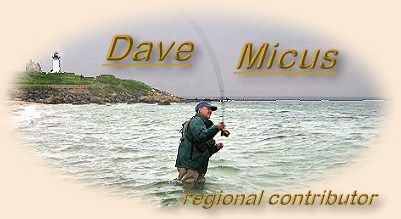|
This is the time of year when the striped bass
are gorging on bait, and the fishing should be
great. Notice I said should. For some reason
the beginning of the migration blitzes hadn't
materialized, and what should be 30 plus fish days
are much, much less. This day it has been much,
much, much less.
Being a "water is always bluer on the other side"
kind of guy, I had paddled all over Plum Island
Sound only to find fish blitzing in the river
that runs in front of my house. Having spent
all morning not even seeing a fish, I'm now
obligated to chase them, and chasing blitzing
fish in the kayak can be a fool's errand. It's
not uncommon to paddle 1,000 yards toward birds
diving and bass slashing only to have it stop,
as if Poseidon flipped a switch, the moment you
arrive. And that is what's happening today, when,
having seen maybe 400 fish feeding, I've only
managed to catch four. I even wonder if the gulls
are having sport, squawking and diving just to watch
me frantically paddle to barren water (I've seen the
way they torture crabs they've cornered on the beach,
so I know such behavior is not beneath them). I'm
ready to ignore their squawks and free fall dives
and just concentrate on the area I occupy, but the
prospect of blitzing fish in the distance is kind
of like walking into a tavern and seeing Pamela
Anderson sitting alone at the end of the bar. You
know the odds are poor, but you just have to try.
The blitzes come to a crashing halt when a wake
boarder pulled by a powerboat decides that the
whole ocean isn't a big enough venue and so
rockets down the channel where I'm fishing.
Being someone who goes to the water to slow down,
I don't understand those who go to speed up.
Besides, boats scare fish, and up to 50% of their
fuel ends up right back in the water, and if I
had my way no powerboat would be allowed anywhere
that is accessible by kayak or canoe. The fish
disappear, and I decide to call it a day.
The next morning is consumed with domestic chores,
and I get a late start. I decide to launch at the
boat ramp at the end of my street instead of in
front of my house. It's a flood tide, and I suspect
that the fish will, like yesterday, be feeding more
toward the mouth of the river and by launching at
the end of the street I'll save myself some paddling.
My instincts are correct; on the marsh bank opposite
the ramp quite a few birds have congregated-gulls,
of course, and cormorants, but, more importantly,
great blue herons and snowy egrets.
Herons and egrets portend better fishing because,
unlike gulls and cormorants that fly and dive for
bait in schools of feeding fish, the herons and
egrets pick spots on shore where they know, don't
ask me how, that the bass will drive the bait fish
to them, and as soon as I launch the yak I can see
schools of busting bass a few yards off shore of
where the birds are gathered. But, unlike yesterday,
the fish continue feeding even as I paddle near, and
at one point I find myself in the middle of a large
school of blitzing bass, getting wet from the spray
of their tails as they slash at bait on the surface.
A fish hits the fly on every cast, the only problem
being they're too damn close. You need to be
something of a contortionist to fish from a yak,
and I modify my methods, casting only three feet
of line with the nine foot leader toward the stern,
and then, using just the rod, skip the fly across
the surface parallel to starboard and toward the
bow, like a baitfish porpoising to escape the
feeding fish. A bass leaves the water and smashes
the fly on the surface three feet from the boat, a
thrilling sight, and by the time I land him I've
drifted past the feeding fish. Rather than risking
spooking the fish by paddling back, I fish backward,
releasing the line on the back cast and as soon as
it hits the water I'm on again.
I'm directly across from the boat ramp and any boater
launching can't help but note the diving gulls and
splashing fish, and will likely zoom over and scatter
the bass in every direction. I keep one eye on the
school and one eye on the ramp, knowing that this
could end at any moment. But the school moves up
river, and now there's a small marsh island blocking
the view from the ramp. The gulls have settled down,
not hovering and diving and giving our position away
to enemy boats, but landing right on the expanding
ring where a fish just fed, as if trying to show me
where the bass are. The cormorants, nervous birds
that will land in the middle of a blitz and dive
under water to feed with the fish (I hope they
don't do that with blues!), keep their distance.
It ends when the blitz moves to a small channel,
and I can't help but crowd the cormorants. They,
predictably, spook, and in their frenzy to flee
raise such a ruckus on the surface that the bass
scatter, too. And that's fine with me; I'm ready
to quit, as this sort of frenetic fishing, while
productive, can be draining. I've caught a whole
day's worth of fish in less than an hour and it's
hard to keep up that level of intensity. I head
for home, feeling what can only be called love
for saltwater, shore birds, fish, and life. ~ Dave
About Dave:
 Dave Micus lives in Ipswich, Massachusetts. He is an
avid striped bass fly fisherman, writer and instructor.
He writes a fly fishing column for the Port City Planet
newspaper of Newburyport, MA (home of Plum Island and Joppa Flats)
and teaches a fly fishing course at Boston University.
Dave Micus lives in Ipswich, Massachusetts. He is an
avid striped bass fly fisherman, writer and instructor.
He writes a fly fishing column for the Port City Planet
newspaper of Newburyport, MA (home of Plum Island and Joppa Flats)
and teaches a fly fishing course at Boston University.
|



